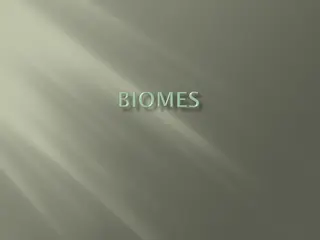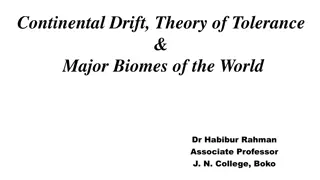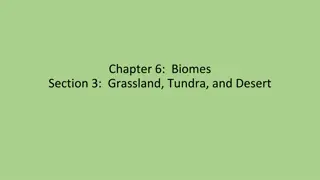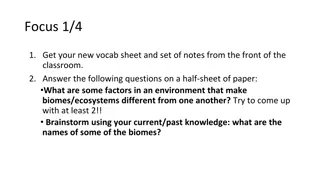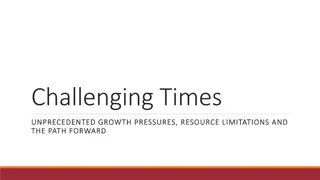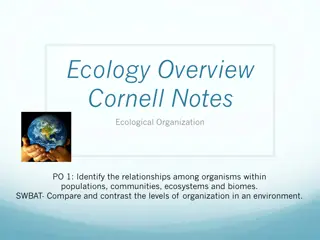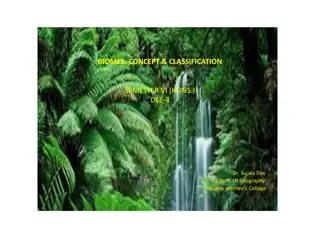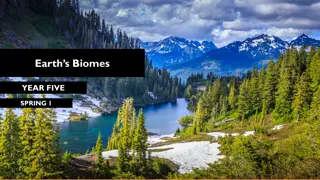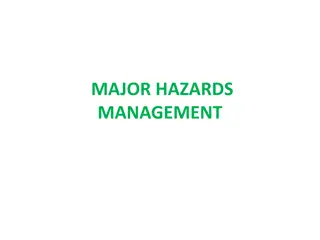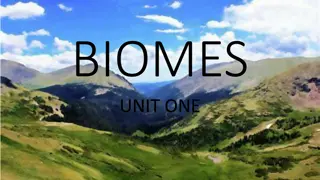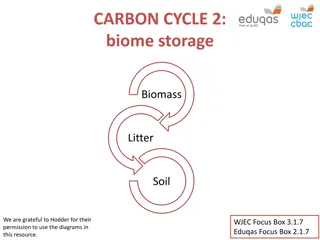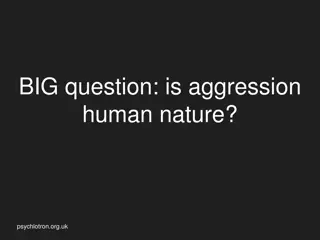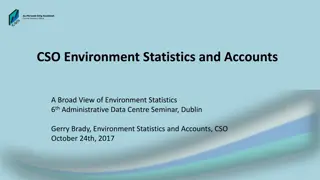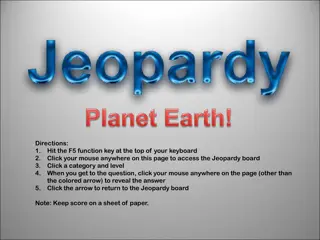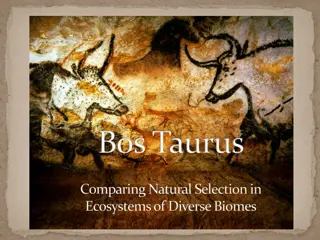Environmental Pressures and Biomes Overview
The content provides an overview of various environmental pressures such as land clearing, deforestation, overharvesting, climate change, and more. It also outlines different biomes including temperate forests, tropical grasslands, deserts, and marine ecosystems. The document aims to highlight the challenges faced by different ecosystems and the importance of conservation efforts.
Download Presentation

Please find below an Image/Link to download the presentation.
The content on the website is provided AS IS for your information and personal use only. It may not be sold, licensed, or shared on other websites without obtaining consent from the author.If you encounter any issues during the download, it is possible that the publisher has removed the file from their server.
You are allowed to download the files provided on this website for personal or commercial use, subject to the condition that they are used lawfully. All files are the property of their respective owners.
The content on the website is provided AS IS for your information and personal use only. It may not be sold, licensed, or shared on other websites without obtaining consent from the author.
E N D
Presentation Transcript
National Regional No. Environmental Pressures 28 9 1 Land clearing for slash and burn agriculture 4 2 2 Land clearing for low-input large scale agriculture Potential Pressures 1 3 Increasing herd size, resulting in overgrazing 28 6 4 Deforestation for fuelwood and charcoal production 10 6 5 Deforestation for mining, particularly ASGM 1 6 Overharvesting of bush-meat 7 Overharvesting of freshwater Fish 2 8 Overharvesting of marine fish 6 3 9 Overharvesting of timber and non-timber forest products) 8 1 10 Encroachment of protected areas 11 Overuse of surface and groundwater systems (rivers and aquifers), 6 3 12 Climate change induced variability (temperature, wind and rainfall) 2 13 Invasive alien species 14 Poaching and illegal wildlife trade -IWT (species and parts) 3 15 Increased air pollution including POPS and Hg from heavy industrial sources Increased consumption of chemicals and subsequent poor disposal that can lead to the introduction of endocrine disruptors, waste pharmaceuticals, and micro plastics into the environment. Poor waste management practices and non-availability of alternative materials that leads to the emission of POPs and the potential for increased marine debris 4 2 16 9 3 17 2 3 18 High concentration of CO2 in the atmosphere due to overreliance on fossil fuels. 4 4 19 Coastal and marine habitat degradation 20 Eutrophication of marine waters
Total No. BIOMES 1 19 Temperate broadleaf and mixed forests Tropical moist and rain lowland forests. 20 1 0 20 Temperate needle-leaf (coniferous) forests Tropical moist and rain montane forests 15 2 0 21 Boreal forests/ Taiga Tropical dry (deciduous) broadleaf forests 6 3 Specific biomes 0 22 Temperate grasslands (steppe and desert grasslands) Tropical grasslands (and savannas) 11 4 0 23 Temperate flooded grasslands (and savannas) Tropical flooded grasslands (and savannas) 6 5 0 24 Temperate shrub-lands Temperate Montane grasslands (steppes and Alpine vegetation) Temperate marshes and wetlands Tropical shrub-lands 0 6 0 25 Tropical montane grasslands (and savannas) 1 7 2 26 Tropical marshes and wetlands 10 8 0 27 Tundra Tropical tidal forests 1 9 0 28 Mediterranean forests Mangroves 31 10 0 29 Mediterranean Woodlands 0 30 Mediterranean scrub Corals 0 11 2 31 Deserts (Temperate zone) Subtropical moist and rain lowland forests 4 12 1 32 Xeric scrublands (spiny thickets) Subtropical moist and rain montane forests 0 13 2 33 Fresh water lakes 1 14 Subtropical dry (deciduous) broadleaf forests 1 34 Fresh Water Rivers 2 15 Subtropical grasslands (and savannas) 17 35 Marine and coastal ecosystem (including estuaries) 0 16 Subtropical flooded grasslands (and savannas) 14 36 Urban and peri-urban ecosystems 0 17 Subtropical shrub-lands 1 37 Other: upper sources of great rivers 0 18 Subtropical montane grasslands 3 38 Other: forested savanna
National Regional No. Potential Solutions 21 8 1 The creation and effective management of protected Areas Environmental Solutions 0 0 2 Prevention, control and management of Invasive Alien Species 5 1 3 Enforcement of law towards protecting threatened species 19 6 4 Climate Smart Agriculture to address degradation in agricultural and rangeland systems 17 11 5 Promote forest and landscape restoration to address forest loss and degradation 0 2 6 Sustainable use of plant and animal genetic resources 7 0 7 Integrating biodiversity into the productive sectors (i.e. forestry, fisheries, mining, etc.) Integrating Biodiversity and ecosystem services into development and finance planning (Including Natural Capital Accounting) 10 4 8 0 0 9 Sustainable Management of Surface & Groundwater systems (freshwater) 1 0 10 Rebuilding Marine Fisheries 5 2 11 Restore and Protect Coastal Habitats 2 4 12 Reduce transboundary pollution of Coasts and Large Marine Ecosystems Develop the enabling conditions, tools and environment for the sound management of harmful chemicals and wastes Reduce the prevalence of harmful chemicals and waste and support the implementation of clean alternative technologies/substances. 3 3 13 4 2 14 4 4 15 Utilization of renewable energy 3 5 16 Development of efficient energy technologies in key sector (industry, commercial, transport and residential) 1 1 17 Promote integrated low-carbon urban systems 3 1 18 Promote transfer and development of low-carbon technologies Promote innovative business models, financing and policy mechanism to support low-carbon technologies at scale 1 0 19
Total GEF programming modalities Programming Modalities 45 Integrated Approach Programs (i.e. Food Security, Commodities) Programmatic Approaches using PFD and Child Projects (i.e. Illegal Wildlife Trade) 16 28 Regional Multifocal Area Projects 40 National Multifocal Area Projects 10 Single Focal Area Projects 5 Global projects Other: Regional project in the same ecosystem as forest sustainable management West Africa 1 1 Other: Sustainable Waste Management 1 Other: Successive projects to address issues Other: Income Generating Activities are essential points we have to insist to address Global Environment Benefits. 1
Coastal West Africa Trends GEF ECW 2016
Biomes Mangroves Tropical moist and rain lowland forests Marine and coastal ecosystem (including estuaries) Urban and peri-urban ecosystems Tropical grasslands (and savannas) Tropical marshes and wetlands Tropical moist and rain montane forests Tropical flooded grasslands (and savannas) Tropical dry (deciduous) broadleaf forests Subtropical moist and rain lowland forests Other: forested savanna Fresh water lakes Deserts (Temperate zone) Temperate marshes and wetlands Subtropical grasslands (and savannas) Other: upper sources of great rivers Fresh Water Rivers Xeric scrublands (spiny thickets) Temperate broadleaf and mixed forests Subtropical dry (deciduous) broadleaf forests Tropical tidal forests Tropical montane grasslands (and savannas) 0 5 10 15 20 25 30 35
Mangroves Tropical moist and rain lowland forests Marine and coastal ecosystem (including Urban and peri-urban ecosystems Tropical grasslands (and savannas) Tropical marshes and wetlands Tropical moist and rain montane forests Tropical flooded grasslands (and savannas) Tropical dry (deciduous) broadleaf forests Subtropical moist and rain lowland forests 0 5 10 15 20 25 30 35
Environmental Pressures Overharvesting of timber and non-timber forest products) Regional Overharvesting of bush-meat Increasing herd size, resulting in overgrazing National High concentration of CO2 in the atmosphere due to overreliance on fossil fuels. Invasive alien species Increased air pollution including POPS and Hg from heavy industrial sources Encroachment of protected areas Coastal and marine habitat degradation Increased consumption of chemicals and subsequent poor disposal that can lead to the introduction of endocrine disruptors, waste pharmaceuticals, and micro Land clearing for low-input large scale agriculture Climate change induced variability (temperature, wind and rainfall) Poor waste management practices and non-availability of alternative materials that leads to the emission of POPs and the potential for increased marine debris Deforestation for mining, particularly ASGM Deforestation for fuelwood and charcoal production Land clearing for slash and burn agriculture 0 5 10 15 20 25 30
Coastal and marine habitat degradation Regional Increased consumption of chemicals and subsequent poor disposal that can National Land clearing for low-input large scale agriculture Climate change induced variability (temperature, wind and rainfall) Poor waste management practices and non-availability of alternative Deforestation for mining, particularly ASGM Deforestation for fuelwood and charcoal production Land clearing for slash and burn agriculture 0 5 10 15 20 25 30
Solutions Solutions Regional Other: Integrated Waste Management Sustainable Management of Surface & Groundwater systems (freshwater) National Sustainable use of plant and animal genetic resources Prevention, control and management of Invasive Alien Species The creation and effective management of protected Areas Climate Smart Agriculture to address degradation in agricultural and rangeland Promote forest and landscape restoration to address forest loss and degradation Integrating Biodiversity and ecosystem services into development and finance Integrating biodiversity into the productive sectors (i.e. forestry, fisheries, mining, etc.) Utilization of renewable energy Restore and Protect Coastal Habitats Enforcement of law towards protecting threatened species Reduce the prevalence of harmful chemicals and waste and support the Promote transfer and development of low-carbon technologies Development of efficient energy technologies in key sector (industry, commercial, Develop the enabling conditions, tools and environment for the sound management Reduce transboundary pollution of Coasts and Large Marine Ecosystems The country hosts an important population of chimps that deserves to be protected Other: The Northern part of the country (Guinea) is affected by negative impacts of Other: Mangrove management is a national and regional concern that the GEF Promote innovative business models, financing and policy mechanism to support Promote integrated low-carbon urban systems Rebuilding Marine Fisheries 0 5 10 15 20 25
The creation and effective management of Climate Smart Agriculture to address degradation in Promote forest and landscape restoration to Integrating Biodiversity and ecosystem services into Integrating biodiversity into the productive sectors Utilization of renewable energy Restore and Protect Coastal Habitats Enforcement of law towards protecting threatened Reduce the prevalence of harmful chemicals and Promote transfer and development of low-carbon Regional National Development of efficient energy technologies in Develop the enabling conditions, tools and Reduce transboundary pollution of Coasts and 0 5 10 15 20 25
Programming Modality Other: Income Generating Activities are essential points we have to insist to address Global Other: Sustainable Waste Management Other: Regional project in the same ecosystem as forest sustainable management West Africa Other: Successive projects to address issues Global projects Single Focal Area Projects Programmatic Approaches using PFD and Child Projects (i.e. Illegal Wildlife Trade) Regional Multifocal Area Projects National Multifocal Area Projects Integrated Approach Programs (i.e. Food Security, Commodities) 0 5 10 15 20 25 30 35 40 45 50
Global projects Single Focal Area Projects Programmatic Approaches using PFD and Child Projects (i.e. Illegal Wildlife Regional Multifocal Area Projects National Multifocal Area Projects Integrated Approach Programs (i.e. Food Security, Commodities) 0 10 20 30 40 50







